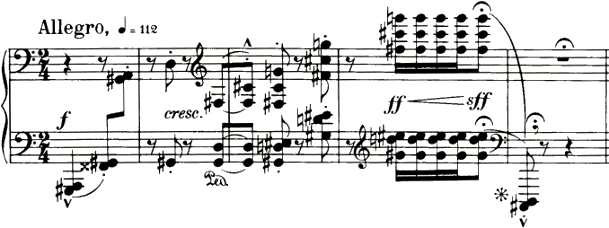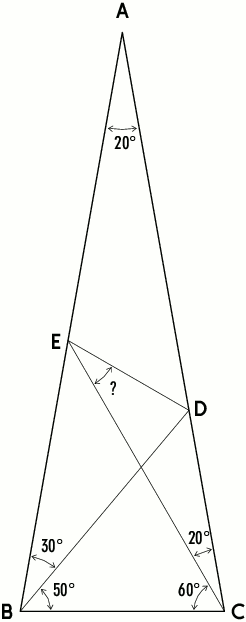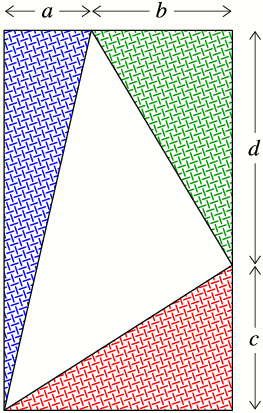Tuesday 31 Dec 2013 comment?
Around 1987, while living in Boulder, Colorado, I thought I saw in a newspaper that Isaac Stern would be playing one of my favorite Bartók pieces in Denver the next evening: the first sonata for violin and piano. Isaac Stern was not only an absolutely top-notch musician, he was also a hero to me for having championed Bartók, playing his works earlier and more often than most of his peers did. Clearly I wanted to see him play.
I went to buy a ticket and found out I was mistaken, the concert was that night, not the next, and due to start in less than an hour. There was no getting to the concert on time by driving anywhere close to the speed limit, leaving little alternative. I hit 115 miles/hour in one stretch where the road was empty. An usher showed me to my seat just as the performers were taking the stage.
The Sonata #1 for Violin and Piano is a harsh piece even for Bartók. It's not just that it dates from his most dissonant period, it's also that Bartók saw piano and violin as incompatible and wrote vastly different—yet complementary—parts for the two instruments. It was the second of two pieces on the first half of the program; during the intermission I overheard an audient say, "Well, the first piece was nice."
Much of Bartók's piano writing is percussive. Some players think this means they should pound the daylights out of the instrument, sort of like the idea that Sichuan food has to be caustic‑hot in order to be authentic. I've seen this more in live performances than on recordings. I don't remember the name of the piano operator who appeared with Isaac Stern that evening but I do remember that he played too hard for my taste. Alexander Zakin, who played the piano part on several of Stern's recordings of this piece, really got the music and didn't play for shock value. And for what it's worth, Bartók exhibited restraint when he played piano himself.
That said, I don't think a lighter touch at the keyboard would have made that person I overheard like the piece. The piano kicks off the last movement with Gentle and soothing it isn't. But neither is it
haphazard or reckless. This is deeply personal, expressive music.
Gentle and soothing it isn't. But neither is it
haphazard or reckless. This is deeply personal, expressive music.
Isaac Stern once wrote back to an angry concert-goer who didn't like a Bartók piece he had played. As Stern put it, "I explained that solo performers chose music in which they believed."
Around 1987, while living in Boulder, Colorado, I thought I saw in a newspaper that Isaac Stern would be playing one of my favorite Bartók pieces in Denver the next evening: the first sonata for violin and piano. Isaac Stern was not only an absolutely top-notch musician, he was also a hero to me for having championed Bartók, playing his works earlier and more often than most of his peers did. Clearly I wanted to see him play.
I went to buy a ticket and found out I was mistaken, the concert was that night, not the next, and due to start in less than an hour. There was no getting to the concert on time by driving anywhere close to the speed limit, leaving little alternative. I hit 115 miles/hour in one stretch where the road was empty. An usher showed me to my seat just as the performers were taking the stage.
The Sonata #1 for Violin and Piano is a harsh piece even for Bartók. It's not just that it dates from his most dissonant period, it's also that Bartók saw piano and violin as incompatible and wrote vastly different—yet complementary—parts for the two instruments. It was the second of two pieces on the first half of the program; during the intermission I overheard an audient say, "Well, the first piece was nice."
Much of Bartók's piano writing is percussive. Some players think this means they should pound the daylights out of the instrument, sort of like the idea that Sichuan food has to be caustic‑hot in order to be authentic. I've seen this more in live performances than on recordings. I don't remember the name of the piano operator who appeared with Isaac Stern that evening but I do remember that he played too hard for my taste. Alexander Zakin, who played the piano part on several of Stern's recordings of this piece, really got the music and didn't play for shock value. And for what it's worth, Bartók exhibited restraint when he played piano himself.
That said, I don't think a lighter touch at the keyboard would have made that person I overheard like the piece. The piano kicks off the last movement with
 Gentle and soothing it isn't. But neither is it
haphazard or reckless. This is deeply personal, expressive music.
Gentle and soothing it isn't. But neither is it
haphazard or reckless. This is deeply personal, expressive music.
Isaac Stern once wrote back to an angry concert-goer who didn't like a Bartók piece he had played. As Stern put it, "I explained that solo performers chose music in which they believed."
Sunday 22 Dec 2013 comment?
At the risk of it seeming like this is becoming linguistic-curiosities-in-NYTimes-articles-about-Russia-journal, I offer yet another:
Screenshot here in case the Times fixes it.
At the risk of it seeming like this is becoming linguistic-curiosities-in-NYTimes-articles-about-Russia-journal, I offer yet another:
Earlier this year, a court convicted the opposition blogger Aleksei A. Navalny of embezzlement and sentenced him to five years in prison after a trial that was denounced as a farce, only for an appeals court to order his release the next day, allowing him to run a strong though unsuccessful campaign for mayor of Moscow. Few doubt that the sequence of events could have occurred without Mr. Putin's consent."doubt" is, of course, one negation too many.
Screenshot here in case the Times fixes it.
Friday 20 Dec 2013 comment?
From a blog posting on the NY Times web site:
The Guinness Book of World Records used to have an entry for the most‑shot human cannonball, a woman who'd worked with a circus for I can't remember how many years. When she quit, the ringleader expressed doubt that he'd ever find another performer of her caliber.
From a blog posting on the NY Times web site:
Last week Ivan I. Okhlobystin, an actor and writer, who is also an ordained Russian Orthodox priest, called for burning gays alive in ovens. He explained this was necessary to protect Russian children.Describing a priest as a loose canon may be a pun or perhaps an inadvertent misspelling. I like it for the very reason that I'm not sure which it is. The author speaks English quite well—but as a second language.
I have known Okhlobystin for a long time, and for a couple of years I was his editor: He wrote a weekly column for a website I headed up. He had a reputation as something of a loose canon — a very popular one — and at one stage I felt he had gone too far in trying to shock readers. He had written a column titled "Alas, I am a racist," in which he said that if one of his daughters brought home an African man, he would drive them both out into the woods and shoot them.
The Guinness Book of World Records used to have an entry for the most‑shot human cannonball, a woman who'd worked with a circus for I can't remember how many years. When she quit, the ringleader expressed doubt that he'd ever find another performer of her caliber.
Thursday 19 Dec 2013 comment?
Attempts to legislate obscenity are notable for how they inevitably fail to define what it is. In Jacobellis v. Ohio, a justice threw up his hands at the impossibility of defining hard-core pornography and wrote the now-famous line "I know it when I see it". Another justice in the same case said, "The application of any general constitutional tests must thus necessarily be pricked out on a case-by-case basis...".
Miller v. California held that for a work to be obscene, it must be without "serious literary, artistic, political, or scientific value". After Miller, at least one porn movie lampooned that requirement by including contrived highbrow dialogue.
To the notion that more than sex must be depicted in order to legitimize a work, I say: fuck that. I support the right to enjoy porn qua porn. From an obituary for Al Goldstein, a pornographer who died today:
I've known several people who acted in porn movies. One friend who had also been an opera singer told me that porn studios treated him way more fairly and honestly than opera companies ever had.
I note also that many of my favorite artists battled with censorship, e.g. Béla Bartók, Frank Zappa, Alfred Hitchcock, and Stanley Kubrick.
Happy nineteenth, everyone.
Attempts to legislate obscenity are notable for how they inevitably fail to define what it is. In Jacobellis v. Ohio, a justice threw up his hands at the impossibility of defining hard-core pornography and wrote the now-famous line "I know it when I see it". Another justice in the same case said, "The application of any general constitutional tests must thus necessarily be pricked out on a case-by-case basis...".
Miller v. California held that for a work to be obscene, it must be without "serious literary, artistic, political, or scientific value". After Miller, at least one porn movie lampooned that requirement by including contrived highbrow dialogue.
To the notion that more than sex must be depicted in order to legitimize a work, I say: fuck that. I support the right to enjoy porn qua porn. From an obituary for Al Goldstein, a pornographer who died today:
His lawyers argued that the anticensorship diatribes in Screw made the magazine sufficiently political, though Mr. Goldstein himself ridiculed this defense, insisting that a reader's erection "is its own redeeming value." After three years and two trials his conviction in the first was overturned, and the second ended in a hung jury.Pricked out, hung jury, ... . One gets the impression judges and journalists alike are not unamused by the subject.
I've known several people who acted in porn movies. One friend who had also been an opera singer told me that porn studios treated him way more fairly and honestly than opera companies ever had.
I note also that many of my favorite artists battled with censorship, e.g. Béla Bartók, Frank Zappa, Alfred Hitchcock, and Stanley Kubrick.
Happy nineteenth, everyone.
Sunday 15 Dec 2013 comment?
The joys of dovetail joints include:
Hand-cut dovetails look especially fine but I don't have the temperament to do that kind of work.
Around 1982, I wanted to make a box with dovetail joints and asked my dad to show me how to cut them with a router. He showed me the standard way dovetails are done on boxes, two pieces with tongues on each end and two pieces with grooves. The box has mirror symmetry.
I said I wanted each piece to have a tongued end and a grooved end, giving the box rotational but not mirror symmetry. My dad was sure this would not work. I disagreed. He said, "I do things by the book" and I doubt that any other six words would better sum up an essential difference between me and him. What happened next was familiar: he said, "You're on your own" and left the room.
I gave the box to my friend Howard who, as I knew he would, really liked the rotational symmetry. Howard and I were on the same wavelength to a degree greater than I have ever experienced with anyone else.
The joys of dovetail joints include:
- the satisfying purity of requiring neither screws nor nails
- everyone likes how they look
- parts contact with lots of surface area (good gluing)
- the only wood joint mentioned in a Beatles song
Hand-cut dovetails look especially fine but I don't have the temperament to do that kind of work.
Around 1982, I wanted to make a box with dovetail joints and asked my dad to show me how to cut them with a router. He showed me the standard way dovetails are done on boxes, two pieces with tongues on each end and two pieces with grooves. The box has mirror symmetry.
I said I wanted each piece to have a tongued end and a grooved end, giving the box rotational but not mirror symmetry. My dad was sure this would not work. I disagreed. He said, "I do things by the book" and I doubt that any other six words would better sum up an essential difference between me and him. What happened next was familiar: he said, "You're on your own" and left the room.
I gave the box to my friend Howard who, as I knew he would, really liked the rotational symmetry. Howard and I were on the same wavelength to a degree greater than I have ever experienced with anyone else.
Tuesday 10 Dec 2013 comment?
"The behavioral aspects of cats that cause their owners to become attached to them are still undetermined."
Vocal recognition of owners by domestic cats (Felis catus)
Atsuko Saito, Kazutaka Shinozuka
Animal Cognition 16:685-690
Sunday 08 Dec 2013 comment?
 Another geometry problem. I wanted to solve it myself before posting it,
but after trying for a while (taking time out for meals, of course)
I gave up.
Rather than saying how hard it is, I'll let you see for yourself.
Another geometry problem. I wanted to solve it myself before posting it,
but after trying for a while (taking time out for meals, of course)
I gave up.
Rather than saying how hard it is, I'll let you see for yourself.
This is one of a family of problems involving 80-80-20 isosceles triangles. Sizes of a few angles are marked; the problem is to determine the size of angle CED using only basic Euclidean geometry: drawing lines, recognizing similar and congruent triangles, that kind of stuff. The point is to do it without analytic geometry or trigonometry. A proof is easy to follow; inventing one is another matter. Solutions exist on the web, but trying to solve it on your own will give an appreciation of the problem. Here's the diagram in PDF if you want to print a copy. |
Thursday 05 Dec 2013 1 comment

I got a request recently for more geometry problems. There's a gnarly problem I want to post but I'm still working on it. For today, an easy one: A (white) triangle is inscribed in a rectangle such that the remaining triangles (red, green, and blue) all have equal area. What proportions b/a and d/c do triangle vertices divide sides of the rectangle into? Calculating the answer isn't hard. The fun here is in guessing it first. |
Tuesday 03 Dec 2013 comment?
The UK Parliament recently questioned Guardian editor Alan Rusbridger about his paper's reporting of the material leaked by Edward Snowden. Among those asking questions was MP Michael Ellis:
It wasn't all that long ago that being gay could get you fired from the NSA. In 1980, the NSA suspected that one of their linguists, Jamie Shoemaker, was gay and started an investigation. In questioning, Mr. Shoemaker admitted he was gay; several days later, a supervisor called him into his office and urged him to resign, saying that if he didn't he'd be fired.
Mr. Shoemaker contacted lawyer Frank Kameny, who told the NSA supervisor there would be no resignation and that "if the case had to be fought, it would be fought to the accompaniment of a torrent of publicity of our making... which would not be of the Agency's liking."
The NSA let Mr. Shoemaker keep his job if he signed an agreement including this condition:
But really, what made me want to blog today about the hearings was the part about the theatrical destroying of computers (as if copies of the Snowden documents didn't exist elsewhere):
Will it blend? — that is the question.
The UK Parliament recently questioned Guardian editor Alan Rusbridger about his paper's reporting of the material leaked by Edward Snowden. Among those asking questions was MP Michael Ellis:
Ellis: | In part, from your own newspaper on 2 August, which is still available online, because you refer to the fact that GCHQ has its own Pride group for staff and I suggest to you that the data contained within the 58,000 documents also contained data that allowed your newspaper to report that information. It is therefore information now that is not any longer protected under the laws and that jeopardises those individuals, does it not? |
Rusbridger: | You've completely lost me, Mr. Ellis. There are gay members of GCHQ, is that a surprise? |
Ellis: | It's not amusing, Mr. Rusbridger. They shouldn't be outed by you and your newspaper. |
Rusbridger: | The notion of the existence of a Pride group within GCHQ, actually if you go to the Stonewall website you can find the same information there. I fail to see how that outs a single member of GCHQ. |
It wasn't all that long ago that being gay could get you fired from the NSA. In 1980, the NSA suspected that one of their linguists, Jamie Shoemaker, was gay and started an investigation. In questioning, Mr. Shoemaker admitted he was gay; several days later, a supervisor called him into his office and urged him to resign, saying that if he didn't he'd be fired.
Mr. Shoemaker contacted lawyer Frank Kameny, who told the NSA supervisor there would be no resignation and that "if the case had to be fought, it would be fought to the accompaniment of a torrent of publicity of our making... which would not be of the Agency's liking."
The NSA let Mr. Shoemaker keep his job if he signed an agreement including this condition:
I will take steps, within the next 60 days, to reduce my vulnerability to blackmail or extortion by informing the members of my family of my sexual preference.
But really, what made me want to blog today about the hearings was the part about the theatrical destroying of computers (as if copies of the Snowden documents didn't exist elsewhere):
Keith Vaz: | The ceremony that took place in your basement, the secret ceremony attended by yourself and others, how many people were there? |
Rusbridger: | There were two from the GCHQ side and I think two or three from The Guardian. |
Keith Vaz: | And you all just broke up the hard drives and the laptops, is that right? |
Rusbridger: | Yeah. It's harder to smash up a computer than you might think. I believe they had a giant food mixer, things like food mixers into which you can drop the computer. |
Keith Vaz: | So the food mixer was brought to the basement? |
Rusbridger: | No, we did it with Black and Deckers. |
Will it blend? — that is the question.
current journal
FAQ
contact
rss/xml
atom/xml
spam notice
archive
FAQ
contact
rss/xml
atom/xml
spam notice
archive
| jan | feb | mar |
| apr | may | jun |
| jul | aug | sep |
| oct | nov | dec |
| jan | feb | mar |
| apr | may | jun |
| jul | aug | sep |
| oct | nov | dec |
| jan | feb | mar |
| apr | may | jun |
| jul | aug | sep |
| oct | nov | dec |
| jan | feb | mar |
| apr | may | jun |
| jul | aug | sep |
| oct | nov | dec |
| jan | feb | mar |
| apr | may | jun |
| jul | aug | sep |
| oct | nov | dec |
| jan | feb | mar |
| apr | may | jun |
| jul | aug | sep |
| oct | nov | dec |
| jan | feb | mar |
| apr | may | jun |
| jul | aug | sep |
| oct | nov | dec |
| jan | feb | mar |
| apr | may | jun |
| jul | aug | sep |
| oct | nov | dec |
| jan | feb | mar |
| apr | may | jun |
| jul | aug | sep |
| oct | nov | dec |
| jan | feb | mar |
| apr | may | jun |
| jul | aug | sep |
| oct | nov | dec |
| jan | feb | mar |
| apr | may | jun |
| jul | aug | sep |
| oct | nov | dec |
| jan | feb | mar |
| apr | may | jun |
| jul | aug | sep |
| oct | nov | dec |
| jan | feb | mar |
| apr | may | jun |
| jul | aug | sep |
| oct | nov | dec |
| jan | feb | mar |
| apr | may | jun |
| jul | aug | sep |
| oct | nov | dec |
| jan | feb | mar |
| apr | may | jun |
| jul | aug | sep |
| oct | nov | dec |
| jan | feb | mar |
| apr | may | jun |
| jul | aug | sep |
| oct | nov | dec |
| jan | feb | mar |
| apr | may | jun |
| jul | aug | sep |
| oct | nov | dec |
| jan | feb | mar |
| apr | may | jun |
| jul | aug | sep |
| oct | nov | dec |
| jan | feb | mar |
| apr | may | jun |
| jul | aug | sep |
| oct | nov | dec |
| jan | feb | mar |
| apr | may | jun |
| jul | aug | sep |
| oct | nov | dec |
| jan | feb | mar |
| apr | may | jun |
| jul | aug | sep |
| oct | nov | dec |
| jan | feb | mar |
| apr | may | jun |
| jul | aug | sep |
| oct | nov | dec |
| jan | feb | mar |
| apr | may | jun |
| jul | aug | sep |
| oct | nov | dec |


